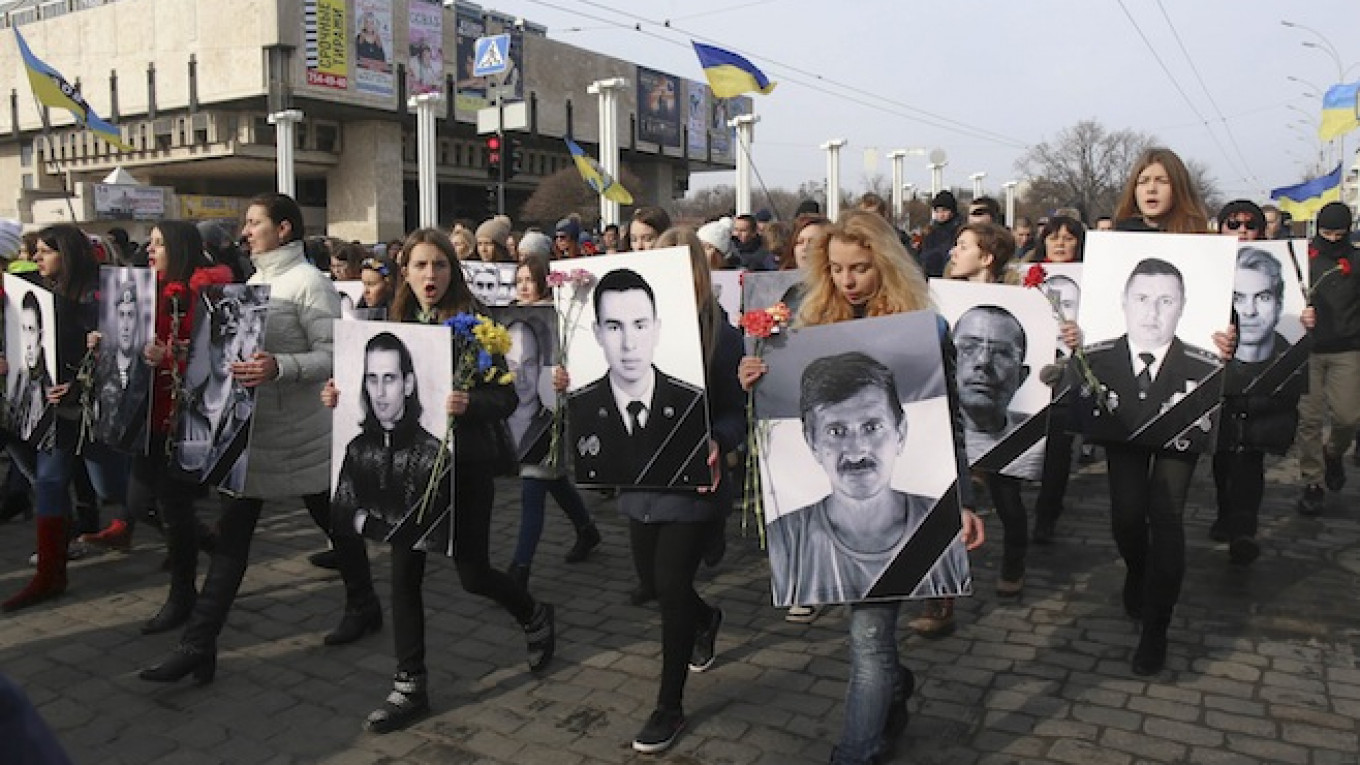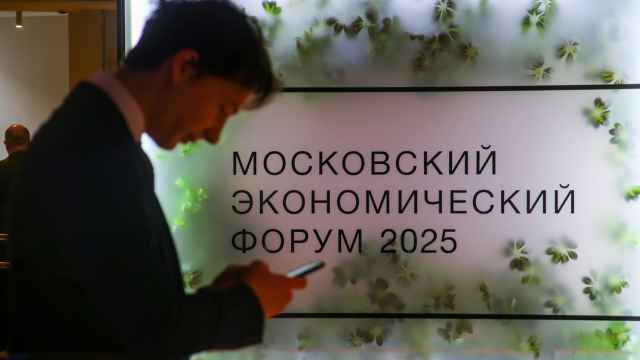NIZHNYAYA KRYNKA/KHARKIV — The Ukrainian government has said it fears unrest could spread beyond territory held by pro-Russian separatists, after an explosion killed two people at a memorial rally in an eastern city far from the front line.
Kiev said Sunday it arrested four people who had been armed and trained in Russia after the blast, which killed a policeman and a demonstrator at the rally in Kharkiv, the biggest city in the east, 200 kilometers from the war zone.
A week after a cease-fire agreement that Moscow-backed rebels ignored to capture a strategic town, Kiev and its Western allies are trying to determine whether the separatists will now halt, or advance deeper into territory the Kremlin calls "New Russia."
Germany and France mediated the peace deal that came into effect a week ago, and say they still hope it can be resurrected, even though the rebels ignored it to inflict one of the worst defeats of the war, seizing the town of Debaltseve after encircling thousands of Ukrainian troops.
In signs that there may be at least a pause now that the rebels achieved that objective, government and separatist forces exchanged prisoners overnight. The rebels said Sunday that they would begin withdrawing artillery from the front.
But Kiev said Moscow was moving more troops and armor into eastern Ukraine near a port it fears is the next target. Russia denies it has troops in eastern Ukraine.
'Terrorist Scum'
Ukrainians held marches and memorial services on Sunday for 100 people killed a year ago during an uprising that toppled a pro-Russian president and led to the war in which more than 5,500 people have since been killed.
At the rally in Kharkiv, amateur footage posted on the Internet showed a few hundred marchers with Ukrainian flags, who shouted "Glory to the Heroes!" just before being hit by an explosion. Demonstrators and bystanders, including a woman pushing a baby in a pram, fled in panic. A wounded man in military uniform lay in the snow shouting for help.
"Today is memorial Sunday, but on this day terrorist scum revealed its predatory nature," President Petro Poroshenko said on Facebook. "This is a brazen attempt to expand the territory of terrorism."
A journalist at the scene later filmed the bodies of two men lying by the road, draped in blue and yellow Ukrainian flags and surrounded by shrapnel.
Demonstrator Igor Rossokha told Reuters Television that his friend Igor was one of those killed: "We tried to give him first aid, but the paramedics arrived and said he had died instantly because he was struck in the heart."
Kiev has long worried that Russia aims to foment instability far beyond regions now held by separatists. Kharkiv, with 1.4 million people, has occasionally seen violent protests by separatists in the past year but is firmly under Kiev's control.
Markian Lubkivskyi, an aide to the head of Ukraine's SBU security service, said four arrested suspects planned a series of attacks in the city with a Russian "Shmel" rocket launcher.
"They are Ukrainian citizens, who underwent instruction and received weapons in the Russian Federation, in Belgorod," he told Ukraine's 112 Television. Belgorod is a city across the nearby Russian border from Kharkiv.
Moscow did not immediately respond to the accusations. It has long denied aiding its militant sympathizers in Ukraine.
Attacks
Ukraine's most immediate fear is of an attack on the port of Mariupol near the front, with 500,000 people the biggest government-held city in the two rebellious provinces.
The Ukrainian military said the rebels were pressing on with attacks on government forces nearby, and Moscow was reinforcing.
Spokesman Andriy Lysenko said a military train carrying 60 armored vehicles including tanks had arrived in the town of Amvrosiivka from Russia on Saturday. A convoy of military equipment had later crossed the border near Novoazovsk, east of Mariupol on the Sea of Azov.
He said fighting was in progress at the village of Shyrokyne, east of Mariupol.
"Our soldiers are holding their positions," Lysenko said, adding that there had been a total of 44 attacks by separatists across the conflict zone in the past 24 hours.
Journalists saw a 20-vehicle convoy of separatist military trucks with anti-aircraft missile systems and howitzers heading west from the recently-captured town of Debaltseve.
Still, the rebels are no longer publicly disavowing the cease-fire, as they did at the start of last week when they said it did not apply to Debaltseve, which they captured on Wednesday.
A pro-Russian rebel commander said the separatists would now begin pulling back heavy weapons from the frontline.
"The plan was signed last night … Starting from today there are two weeks to withdraw heavy weapons," Interfax news agency quoted rebel commander Eduard Basurin as saying. Another Russian news agency, TASS, quoted him as saying the pull-back was still being organized and would take place from Tuesday.
For the Ukrainian side, Lysenko said there was no confirmation yet as to whether the rebels had started pulling back weapons.
An exchange of prisoners overnight was one of the most concrete moves yet to implement the peace deal reached on Feb. 12 in the Belarussian capital Minsk, although similar exchanges in the past have often been followed by further fighting.
Journalists in the village of Zholobok, west of the rebel stronghold of Luhansk, watched as more than 130 Ukrainian servicemen were released in return for 53 rebel fighters.
A Message from The Moscow Times:
Dear readers,
We are facing unprecedented challenges. Russia's Prosecutor General's Office has designated The Moscow Times as an "undesirable" organization, criminalizing our work and putting our staff at risk of prosecution. This follows our earlier unjust labeling as a "foreign agent."
These actions are direct attempts to silence independent journalism in Russia. The authorities claim our work "discredits the decisions of the Russian leadership." We see things differently: we strive to provide accurate, unbiased reporting on Russia.
We, the journalists of The Moscow Times, refuse to be silenced. But to continue our work, we need your help.
Your support, no matter how small, makes a world of difference. If you can, please support us monthly starting from just $2. It's quick to set up, and every contribution makes a significant impact.
By supporting The Moscow Times, you're defending open, independent journalism in the face of repression. Thank you for standing with us.
Remind me later.






